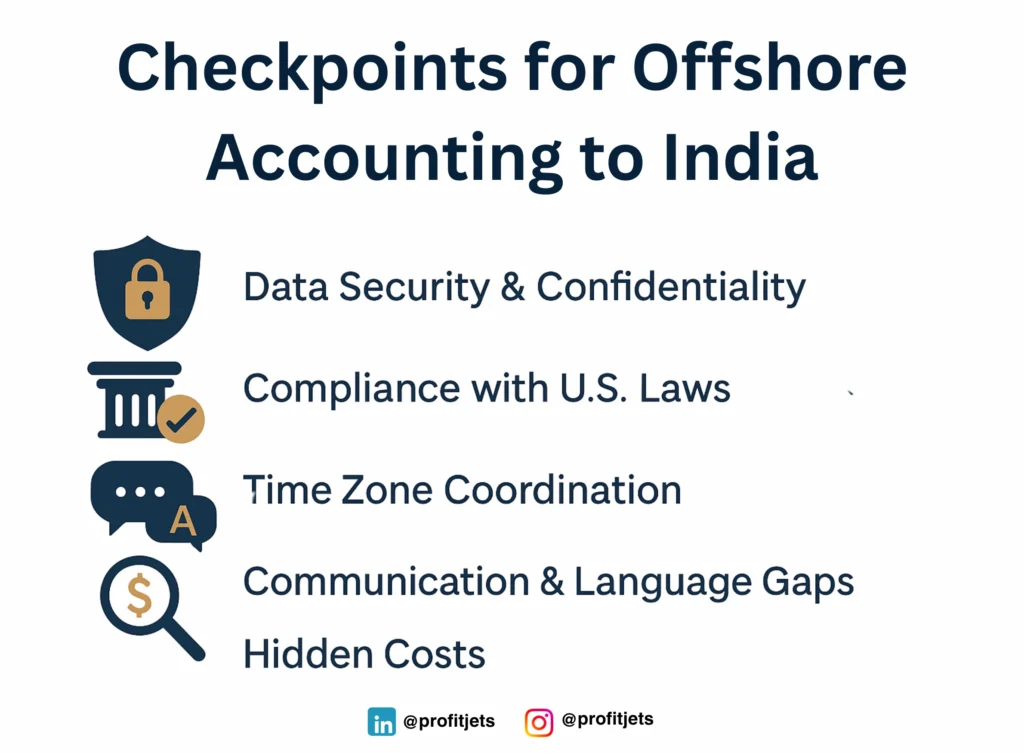Being new to running a firm, a startup, or a small business comes with unique problems. The pressures of persistently high inflation are likely to clamp down on a small firm much sooner than the effects reach a large corporation. Ideas and solutions designed to meet the needs of a business with a price-sensitive market and ever-growing operational costs are welcome topics to discuss and learn about.
In our brainstorming session on how to create a conducive yet cost-efficient environment for businesses to operate more successfully, we came across Offshoring among several other practices. The interesting fact about offshoring is that it’s a common practice, but it hides in plain sight! Some Indian accounting firms white-label their services for U.S. CPAs — meaning your U.S. accountant might already be working with Offshore Accounting Services in India!
What is Offshoring?
Offshoring is the relocation of an operational or service division or the entire operation to another country to gain benefits such as reasonable salaries, less stringent tax laws, or favorable economic conditions. The key idea is to retain ownership while carrying out operations in a different country.
How is offshoring different from outsourcing?
Although both ideas stem from the idea of hiring an external party to manage costs, they are conceptually different.
- Outsourcing is the practice of hiring an external vendor to carry out a designated task or operation, whereas offshoring is moving an operation to a different country while still remaining in control of it.
- Outsourcing could be carried out locally as well, whereas offshoring specifically refers to shifting operations to a different country.
- Outsourcing involves research and delegation, and offshoring requires direct control.
Example of Offshoring: A U.S. Manufacturing company sets up a customer support center in India.
Example of outsourcing: A U.S. tech company hires a vendor in the Philippines to carry out its accounting and taxation needs.
What are some services that can be offshored?
Just about anything! But here’s a list of services that are commonly offshored
- Bookkeeping & Accounting
- Tax Preparation & Filing
- Payroll Processing
- Customer Support
- Data Entry & Admin Tasks
- IT Support & Software Development
- Digital Marketing (SEO, PPC, Content)
- Graphic & Web Design
- Lead Generation & Sales Support
- HR & Recruitment Process Outsourcing (RPO)
The above list indicates a common trend among companies in offshore accounting, bookkeeping, and tax requirements. It’s the most laborious and reparative operation of a firm that yields zero results with a company’s need for innovation or client acquisition! Yet it is a division that needs supervision and verification, as accounting, bookkeeping services, and Tax compliance are complex functionalities that require expertise, accuracy, and legal know-how!
We probed further to see which companies offer offshore accounting services to India, and we were surprised with the results! Although the specific internal vendor details are private, we understand India is a hot favourite among companies.

List of Companies That Offshore Accounting Needs to India
1. IBM: Financial operations, including bookkeeping and back-office accounting.
2. General Electric (GE): Bookkeeping, payroll, and accounts payable functions.
3. American Express: Financial operations, including transaction processing and bookkeeping.
4. Microsoft: General accounting and support services.
While some large corporations were common finds, it was also evident that smaller businesses usually work with Indian bookkeeping and accounting firms as well, e.g., Profitjets is a company focused on accuracy, efficiency, and comprehensive bookkeeping, accounting, and tax solutions at competitive prices.
Why does the US prefer Offshore Accounting Companies from India?
Offshoring bookkeeping, accounting, and tax services from the U.S. to India offers several strategic, operational, and financial advantages, particularly for startups, SMBs, and CPA firms. Some Indian accounting firms white-label their services for U.S. CPAs. Your accountant might already be working with India-based teams!
Benefits of Offshoring to India
1. Cost Savings
- Labor costs are a whopping 60–70% higher in the US when compared to the prices in India.
- You are free of expenses related to employee benefits, insurance, and office space.
- There are fixed, predictable pricing options from vendors that help you manage your budgets.
2. Skilled Talent Pool
- India is, interestingly, home to the 2nd highest English-speaking population in the world; although it’s mostly spoken as 2nd language. India also has a vast pool of finance professionals who hold international certifications such as CPA (US) and ACCA (UK).
- It’s not hard to find proficiency in popular tools like QuickBooks, Xero, NetSuite, FreshBooks, and more.
3. Time Zone Advantage
- India is approximately 12 hours ahead of the U.S., which means you send files at the end of the day and wake up to complete work the next morning!
4. Scalability and Flexibility
- Because India is a popular destination for offshore & outsourcing, they are flexible for periodic hiring to help scale up during tax seasons without long-term hiring.
- They provide modular services, enabling you to choose what suits you best e.g., AR/AP, reconciliation, payroll, and tax prep.
5. Security & Compliance
- Reputable Indian firms are ISO/IEC 27001 certified and use VPNs & secure servers to meet your data security needs.
- Professionals and reputed vendors comply with U.S. tax laws and GAAP.
Checkpoints to Successfully Offshore Your Accounting Needs to India—Tricks of the Trade.
Offshoring your bookkeeping, accounting, and tax functions to India brings great value; however, there are some points to be cautious about to ensure seamless functioning. It makes sense to build a checklist before you onboard offshore accounting companies.

1. Data Security & Confidentiality
- Financial data is highly sensitive; ensure your provider has ISO/IEC 27001 certification.
- Also, ensure your team uses secure file-sharing platforms.
- Signs Non-Disclosure Agreements (NDAs),
- Be sure to monitor and ensure role-based access control to sensitive information.
- It makes sense to set up an independent data mirroring or backup system for a rainy day.
2. Compliance with U.S. Laws
- Ensure your offshore accounting team is familiar with the following:
- U.S. GAAP and IRS regulations and filing procedures (Forms 1099, W-2, etc.)
- Awareness about state-specific tax rules.
Be open to the possibility of training your staff if they fall short of some of these needs.
3. Time Zone Coordination
- India’s time zone can be an advantage, as mentioned earlier, you assign work at the end of the day and find it complete by the time you start work the next day. However, it poses a challenge if you need real-time responses.
- Consider choosing a firm that provides U.S. time zone coverage in case of emergency or if the operation you are looking to offshore has frequent coordination.
- Ensure you have a dedicated point of contact and a backup contact for tricky situations.
4. Communication & Language Gaps
- English is widely spoken, but
- You will find occasional differences in terminology or formatting (e.g., date formats, commas). The US and Indian metric systems are different.
- Consider creating clear SOPs and onboarding sessions to avoid confusion.
5. Hidden Costs
- Avoid vague pricing models, clarify:
- Hourly vs. fixed rates
- Revisions and support charges
- Seasonal pricing spikes (e.g., during U.S. tax season)
- And, Check for Creeping Costs
Consider not offshoring to vendors that offer the lowest price in the market. They possibly lack expertise or have hidden charges that might creep up after creating dependency. Consider value-based pricing, remember what you want is the best value for money, not the lowest price for problematic service.
Even with several authentic reviews and testimonials, it’s best not to let your guard down in the initial days. It’s best to test and verify before you zero in on your offshore accounting team. Consider a Trial Before making a long-term commitment. Start with a small project and, use it to gauge accuracy, speed and communication. You are free to scale as your confident builds.
A Sensitive Need for You to Consider is Cultural Differences.
- The US has more assertive and direct communication, while India tends to be more diplomatic. Establish a more open communication style from the start.
- Be sure to establish clear deadlines, as Indian firms typically have higher flexibility with deadlines.
- While the US has more vacation days and fewer holidays, India has more national and religious holidays. Incorporate it into your work calendar.
Both cultures value hard work and professionalism. The differences are few when compared to the vast majority of non-English speaking nations
What You Need to Know About Offshore Accounting Prices
| Service | Hourly Rate | Monthly Rate |
| In-House Bookkeeper | $20–$26 | $3,200–$3,520* |
| Freelance Bookkeeper | $11–$30 | $400–$2,500 |
| Bookkeeping Firms | $100–$149 | Varies depending on several factors |
| Outsourced Bookkeeper | $8–$12 | $500–$5,000 |
*The US rates include additional benefits, taxes, and overhead costs.

Conclusion
- Cost Savings: Offshoring to India can result in savings of up to 60% compared to hiring locally in the U.S.
- Quality of Service: Indian firms offer skilled professionals familiar with accounting standards and software like QuickBooks and Xero.
- Scalability: Offshore accounting teams can scale services based on business needs, also offering ample flexibility.
- Tricks of the Trade: Understanding some sensitivities makes it easier for you to establish a great working relationship and derive tremendous benefit.
FAQs on Offshore Accounting
1. What is offshore accounting?
The practice of hiring a team in a different country to carry out the bookkeeping, accounting, and taxation of a company while still owning the service unit is called offshore accounting services.
2. What are some offshore accounting companies?
There are several solution providers. However, Profitjets holds the mantle as a trusted vendor that provides accuracy, timely work, a broad plethora of software options, and expertise, along with an efficient bench of professionals to entrust your accounting, bookkeeping, and taxation needs.
3. What are some key points to be aware of while offshoring?
1. Certifications (e.g., CPA/CA)
2. Software proficiency (QuickBooks, NetSuite, etc.)
3. Data security practices
4. Clear communication about deadlines
5. U.S. client testimonials &
6. Understand cultural sensitivities










